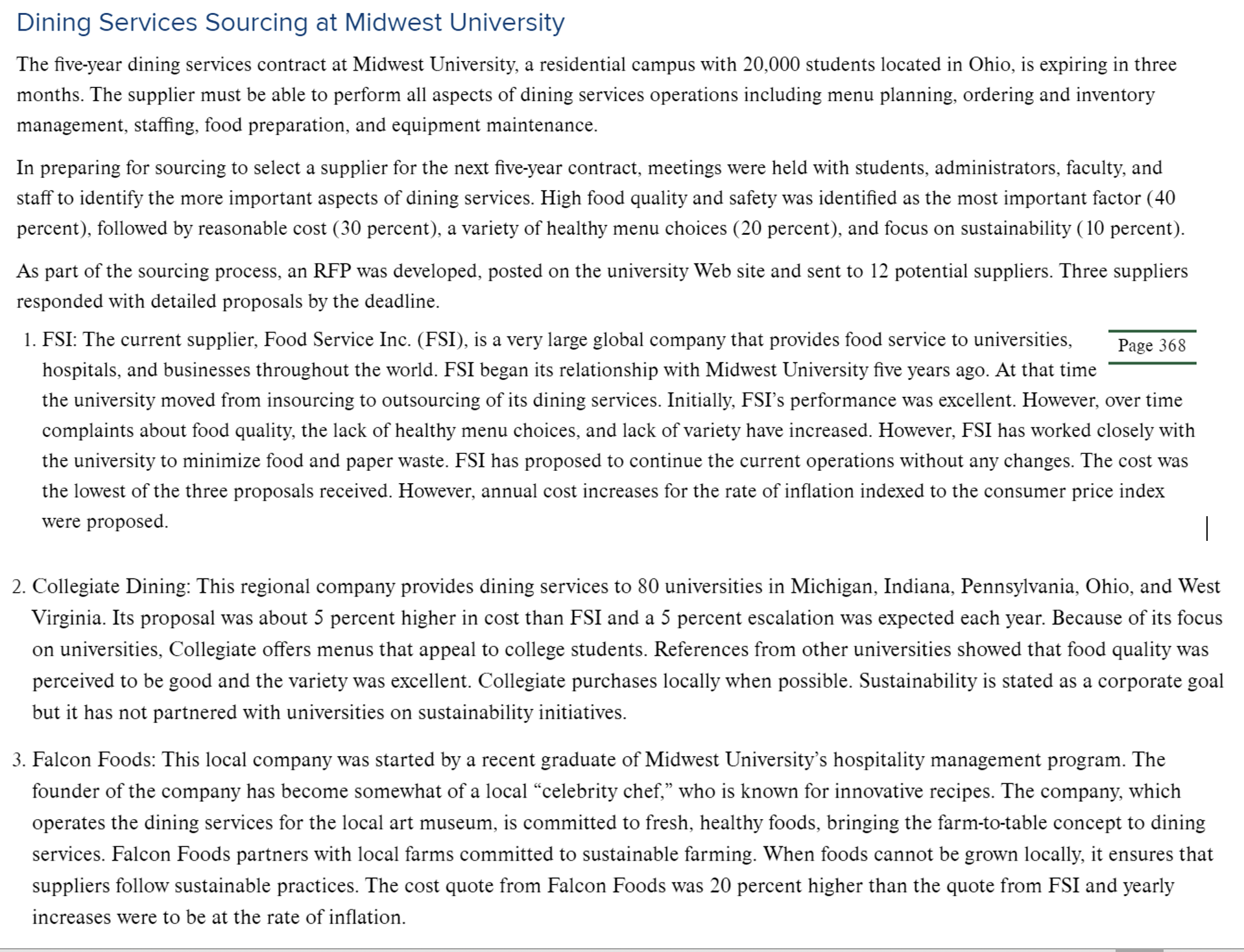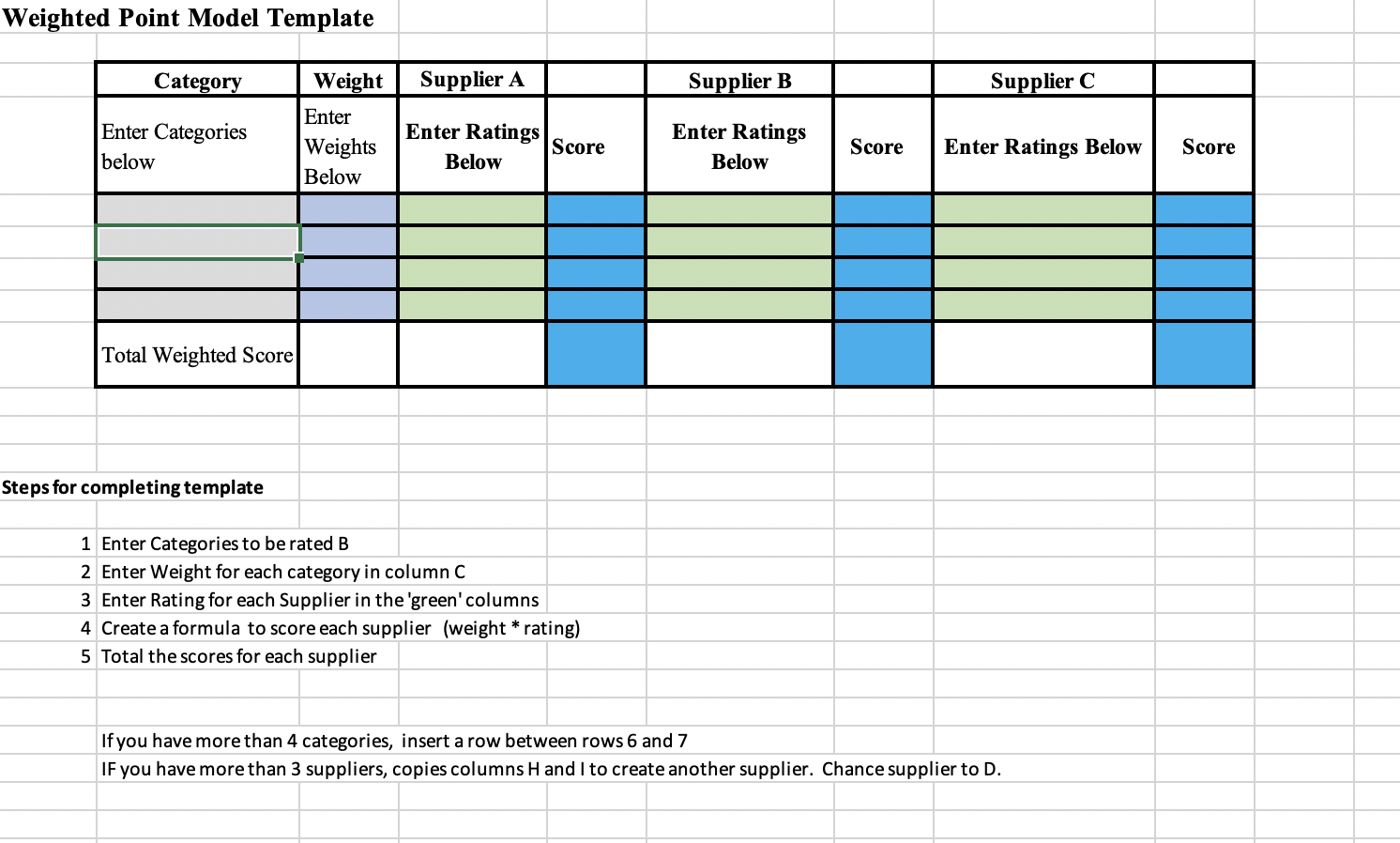Answered step by step
Verified Expert Solution
Question
1 Approved Answer
`` please fill in or create a new chart if possible Questions 1. Using the limited information in the case, develop and apply a weighted

``


please fill in or create a new chart if possible
Questions 1. Using the limited information in the case, develop and apply a weighted point model using a rating scale of 1 (poor) to 5 (excellent). 2. What other benefits and risks do you see for each supplier? 3. Which supplier do you recommend? Why? \begin{tabular}{|c|c|c|c|c|c|c|c|c|} \hline \multicolumn{9}{|c|}{ Weighted Point Model Template } \\ \hline & Category & Weight & Supplier A & & Supplier B & & Supplier C & \\ \hline & EnterCategoriesbelow & EnterWeightsBelow & EnterRatingsBelow & Score & EnterRatingsBelow & Score & Enter Ratings Below & Score \\ \hline & & & & & & & & \\ \hline & & & & & & & & \\ \hline & & & & & & & & \\ \hline & & & & & & & & \\ \hline & Total Weighted Score & & & & & & & \\ \hline & & & & & & & & \\ \hline & & & & & & & & \\ \hline \multicolumn{9}{|c|}{ Steps for completing template } \\ \hline & & & & & & & & \\ \hline 1E & \multicolumn{8}{|c|}{1 Enter Categories to be rated B } \\ \hline 2 & \multicolumn{8}{|c|}{ Enter Weight for each category in column C } \\ \hline 3 & \multicolumn{8}{|c|}{ Enter Rating for each Supplier in the 'green' columns } \\ \hline 4c & \multicolumn{8}{|c|}{ Create a formula to score each supplier (weight * rating) } \\ \hline 57 & \multicolumn{8}{|c|}{ Total the scores for each supplier } \\ \hline & & & & & & & & \\ \hline & & & & & & & & \\ \hline & \multirow{2}{*}{\multicolumn{7}{|c|}{Ifyouhavemorethan4categories,insertarowbetweenrows6and7IFyouhavemorethan3suppliers,copiescolumnsHandItocreateanothersupplier.ChancesuppliertoD.}} & \\ \hline & & & & & & & lier to D. & \\ \hline & & & & & & & & \\ \hline & & & & & & & & \\ \hline \end{tabular} Dining Services Sourcing at Midwest University The five-year dining services contract at Midwest University, a residential campus with 20,000 students located in Ohio, is expiring in three months. The supplier must be able to perform all aspects of dining services operations including menu planning, ordering and inventory management, staffing, food preparation, and equipment maintenance. In preparing for sourcing to select a supplier for the next five-year contract, meetings were held with students, administrators, faculty, and staff to identify the more important aspects of dining services. High food quality and safety was identified as the most important factor (40 percent), followed by reasonable cost ( 30 percent), a variety of healthy menu choices ( 20 percent), and focus on sustainability ( 10 percent). As part of the sourcing process, an RFP was developed, posted on the university Web site and sent to 12 potential suppliers. Three suppliers responded with detailed proposals by the deadline. 1. FSI: The current supplier, Food Service Inc. (FSI), is a very large global company that provides food service to universities, hospitals, and businesses throughout the world. FSI began its relationship with Midwest University five years ago. At that time Page 368 the university moved from insourcing to outsourcing of its dining services. Initially, FSI's performance was excellent. However, over time complaints about food quality, the lack of healthy menu choices, and lack of variety have increased. However, FSI has worked closely with the university to minimize food and paper waste. FSI has proposed to continue the current operations without any changes. The cost was the lowest of the three proposals received. However, annual cost increases for the rate of inflation indexed to the consumer price index were proposed. 2. Collegiate Dining: This regional company provides dining services to 80 universities in Michigan, Indiana, Pennsylvania, Ohio, and West Virginia. Its proposal was about 5 percent higher in cost than FSI and a 5 percent escalation was expected each year. Because of its focus on universities, Collegiate offers menus that appeal to college students. References from other universities showed that food quality was perceived to be good and the variety was excellent. Collegiate purchases locally when possible. Sustainability is stated as a corporate goal but it has not partnered with universities on sustainability initiatives. 3. Falcon Foods: This local company was started by a recent graduate of Midwest University's hospitality management program. The founder of the company has become somewhat of a local "celebrity chef," who is known for innovative recipes. The company, which operates the dining services for the local art museum, is committed to fresh, healthy foods, bringing the farm-to-table concept to dining services. Falcon Foods partners with local farms committed to sustainable farming. When foods cannot be grown locally, it ensures that suppliers follow sustainable practices. The cost quote from Falcon Foods was 20 percent higher than the quote from FSI and yearly increases were to be at the rate of inflationStep by Step Solution
There are 3 Steps involved in it
Step: 1

Get Instant Access to Expert-Tailored Solutions
See step-by-step solutions with expert insights and AI powered tools for academic success
Step: 2

Step: 3

Ace Your Homework with AI
Get the answers you need in no time with our AI-driven, step-by-step assistance
Get Started


